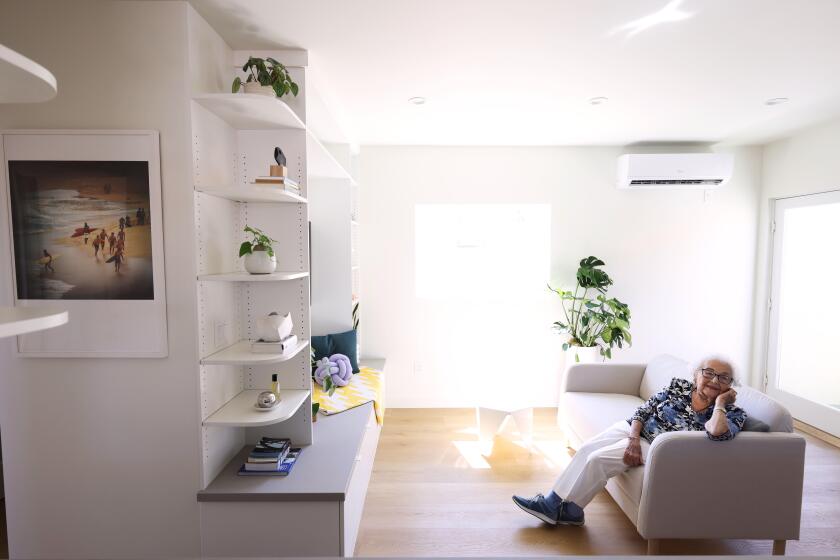Welcome Home : Pride Has Moved Into a Low-Income Housing Complex
Kathy Sube’s to-do list is huge. Basically, though, it all boils down to one major task: transform the Shadow Hills Apartments in Thousand Oaks.
As executive director of Many Mansions, the nonprofit group that bought Shadow Hills from a private developer 15 months ago, Sube is responsible for making the 101 apartments viable--and desirable--housing for low-income families.
And so, her list.
Pick out new tiles for the hallways. Buy pinatas for the Christmas party. Screen applications for rent subsidies. Check on the fire alarms. Clean the pool. And on and on and on.
“We still have a long ways to go,” Sube said.
But they have already come quite a distance.
Poorly maintained, dangerous and woefully overcrowded just a year ago, the Shadow Hills Apartments have become clean, safe, sought-after housing.
At least 85 families are on the waiting list for the cheapest apartments, which cost as little as $484 a month for a one-bedroom unit and are available only to people classified as “very low income.” Another 26 families are waiting for the second-tier apartments--set aside for “low income” and starting at $581 a month.
“People have mad misconceptions about what affordable housing is,” said Debra Richey, resident manager at Shadow Hills. “They need to open their eyes and look at this place and say, ‘Hey, it can work.’ This is a building we can now be proud of.”
Many Mansions bought the complex in September, 1992, with money from a city-backed bond issue that raised nearly $9 million. The group also manages two smaller affordable housing complexes, Schillo Gardens and Glenn Oaks Senior Apartments in Thousand Oaks.
But Shadow Hills is the first project that Many Mansions has bought outright from a private developer. The nonprofit group will pay the bonds back over 50 years with revenue generated from Shadow Hills rents.
Sube is confident she can keep Shadow Hills spruced up and affordable for low-income families and still turn a profit. “The project will pay for itself,” she said firmly.
But before considering profits, she had to tackle the mess.
When Many Mansions took over the complex, the pool had been shut down for health reasons, the elevators reeked of urine and nearly every apartment had holes punched in the walls. Vandals had broken out many windows, and taggers regularly scrawled graffiti across the buildings.
The week after finalizing the purchase, Sube found that Shadow Hills had recently been cited for half a dozen fire-safety violations, from burned-out exit lights to faulty smoke alarms to “self-closing” doors that would not stay shut.
“To say there was a lot of deferred maintenance would be a big understatement,” Sube said wryly.
So Many Mansions jumped in. From the bond-issued funds, the group committed more than $1.25 million to renovate the brown-and-beige buildings on Wilbur Road in central Thousand Oaks.
From installing new doorknobs (some residents had been using string to pull their doors shut) to cleaning the playground (which had been littered with broken glass), the Many Mansions staff of six set about addressing the most pressing problems.
Apartments got fresh paint, working appliances and new carpets. Parking garages got bright lights. The front gate got a security guard. Completing the renovations will take another year. Only 75 units are occupied, with the rest scheduled for rehab soon.
“They’ve taken a building that was run down and suffered from overcrowding and have really turned it around to provide safe and decent housing for many people,” Councilman Frank Schillo said. “I’m really proud of them.”
Residents are equally amazed.
*
As she watched her children romp through the renovated recreation room earlier this week, Anita Castillo recalled how loud screeches used to disrupt her sleep and tough-looking loiterers used to frighten her away from the courtyard.
Now, she said, the apartment complex seems quieter and safer. She also marvels at the proliferation of resident services, run by coordinator Elizabeth Gallardo.
Castillo’s kids can attend the after-school Homework Club and get extra help from California Lutheran University students if they need it. If they go over homework assignments with the tutors regularly, they earn picnics, field trips and other outings.
Castillo herself can pick up cheap groceries--all she needs for $3.25--at the Food Share distribution center set up in the rec room once a month. She can also attend English as a second language classes at night, for just $1 a lesson.
And soon, she’ll be able to run for a seat on the Residents Council or watch her older children play on Shadow Hills sports teams. She’ll also be able to send her preschoolers to a Head Start early-education program next year, right in the apartment complex.
“Before, there wasn’t anything for us here,” Castillo said. “Now, they help us a lot.”
Resident Rosa Pantoja, who has lived in the complex for four years, agreed that Many Mansions has proved a good landlord. “They pay more attention to everything,” Pantoja said. “They care more.”
But when Sube first walked through Shadow Hills, introducing herself and explaining Many Mansion’s mission, few of the residents welcomed her. They had watched too many managers come and go and heard too many idle promises.
“They said they would clean it up and I didn’t believe them. How could they clean this up?” said Angelena Yerena, who has lived in Shadow Hills for five years. “But they did it,” she said proudly.
Many Mansion’s first step demonstrated its commitment to being a different kind of landlord.
In an effort to end overcrowding, the new property managers drastically cut rents. Families no longer had to cram together into a one-bedroom apartment, pooling their resources to come up with the monthly $750 rent.
And once the overcrowding began to ease, peer pressure kicked in, Sube said.
“Once they saw we were making a difference, the people who cared got mad at those who didn’t,” she explained. Eventually, those residents who didn’t care--or didn’t want to follow the new rules--left Shadow Hills.
Those who remained have been working with the staff to help make a onetime slum into a welcoming home.
“There’s something about going to work when you know you can really make a difference,” Sube said, “that makes you want to get up in the morning.”
More to Read
Sign up for Essential California
The most important California stories and recommendations in your inbox every morning.
You may occasionally receive promotional content from the Los Angeles Times.






